 Petzlover
Petzlover Himalayan Mastiff is originated from India but Komondor is originated from Hungary. Both Himalayan Mastiff and Komondor are having almost same height. Himalayan Mastiff may weigh 18 kg / 40 pounds more than Komondor. Himalayan Mastiff may live 3 years more than Komondor. Both Himalayan Mastiff and Komondor has same litter size. Himalayan Mastiff requires Moderate Maintenance. But Komondor requires High Maintenance
Himalayan Mastiff is originated from India but Komondor is originated from Hungary. Both Himalayan Mastiff and Komondor are having almost same height. Himalayan Mastiff may weigh 18 kg / 40 pounds more than Komondor. Himalayan Mastiff may live 3 years more than Komondor. Both Himalayan Mastiff and Komondor has same litter size. Himalayan Mastiff requires Moderate Maintenance. But Komondor requires High Maintenance
 The Himalayan Mastiff or Tibetan Mastiff is an ancient breed. Bred to be guardians of the flock, they could take care of leopards and wolves or anything else that tied to hurt the flock. The Himalaya Mastiff is found in the Himalayan area of Tibet. They are descendants of the Tibetan dogs that developed almost any Mastiff or Molosser on earth. They may have been in the mountains since the early 1100 BC. and have been fairly isolated. It was in this isolation that the Himalayan Mastiff developed.
The Himalayan Mastiff or Tibetan Mastiff is an ancient breed. Bred to be guardians of the flock, they could take care of leopards and wolves or anything else that tied to hurt the flock. The Himalaya Mastiff is found in the Himalayan area of Tibet. They are descendants of the Tibetan dogs that developed almost any Mastiff or Molosser on earth. They may have been in the mountains since the early 1100 BC. and have been fairly isolated. It was in this isolation that the Himalayan Mastiff developed.
Their function at that time was mostly to guard property. In some circumstances an entire village is guarded by one dog. It was also during this period that the breed was taught to be aggressive by tying them up as puppies. They guarded families while the men moved the village flock higher up in the mountains. They stayed in isolation until the mid-1800’s when the Queen of England was given a Himalayan Mastiff. For thousands of years, this dog was a nomad.
Soon the breed was being exported to England. A standard was developed, and the British began to breed them. Next, they were exported to Nepal, Afghanistan, India and the United States. They are rare in Tibet these days but more popular than ever in England and the United States. The first American Himalaya Tibetan Mastiff Association came into being in 1974 and in 2006 it was recognized by the AKC.
Today in the West, the Himalayan is a domesticated, family dog. It hardly fits in an apartment of course. These new western Himalayan Mastiffs are more easy- going than the Tibetan ones, but they are still wary of strangers and somewhat aloof. They are also still very protective and nocturnal. They are smart, independent and stubborn. They are not easy to train but socialization and obedience training is essential.
A study done in 2011 showed that it is very likely that many large breed dogs were descended from this Mastiff. This includes the St. Bernard, the Rottweiler, Bernese Mountain Dog and the Great Pyrenees. Later studies showed that the Mastiff’s ability to survive in the rare air of the Himalayans was due to interbreeding with Tibetan wolves in ancient, prehistoric times. Now they are competing in the Westminster Kennel Club Dog Show.
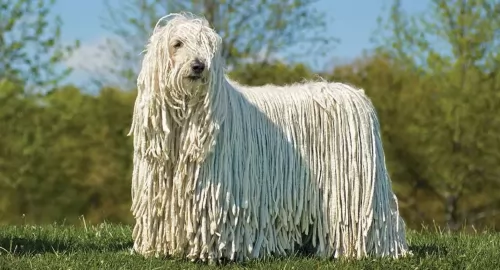 Looking like a giant mop, and sometimes being referred to as 'mop dogs' the Komondor, known also as the Hungarian sheepdog, hails from Hungary.
Looking like a giant mop, and sometimes being referred to as 'mop dogs' the Komondor, known also as the Hungarian sheepdog, hails from Hungary.
The dog was brought to Europe centuries ago so he is a well established breed. It has been declared as one of the country's national treasures.
He is a dog related to many other dogs such as the Pulim the Ovcharka, the Bearded Collie, Old English Sheepdog and others.
 The Himalayan Mastiff is a giant, massive dog longer than it is tall. The breed has a heavy, broad head and square muzzle. They have black noses, a level bite and almond shaped, slanted, deep set eyes. They are brown, and the ears hang close to the head. They are heavy, muscular and sturdy. They have a feathered tail curving over their back. With a heavy, thick double coat and mane they resemble a lion at times. The coat can be brown, black, and gray-blue with gold or tan markings. These are impressive and noble dogs, athletic, with cat like feet. They are agile and light on their feet.
The Himalayan Mastiff is a giant, massive dog longer than it is tall. The breed has a heavy, broad head and square muzzle. They have black noses, a level bite and almond shaped, slanted, deep set eyes. They are brown, and the ears hang close to the head. They are heavy, muscular and sturdy. They have a feathered tail curving over their back. With a heavy, thick double coat and mane they resemble a lion at times. The coat can be brown, black, and gray-blue with gold or tan markings. These are impressive and noble dogs, athletic, with cat like feet. They are agile and light on their feet.
According to some breeders there are two different kinds or types of Himalayan Mastiff. These are the Tsang-khyi or the monastery mastiff type and the Do-khyi or the nomad mastiff type. The monastery is a heavier, taller dog who face is very wrinkled while the nomad is a leaner dog with less facial wrinkles. In any litter there can be both kinds. The kind of work that was given to each dog was dependent on their type. The Monastery kind is given stationary jobs and the nomad kind got the active jobs.
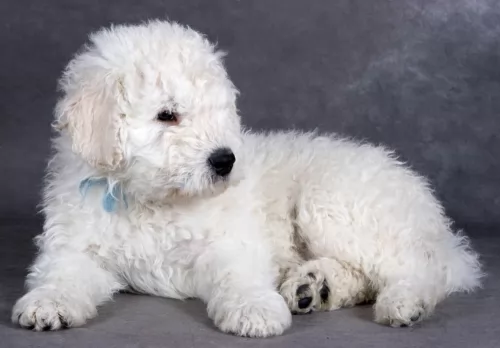 Known for his unique long corded, singular white coat, the Komondor, a molosser dog, is large. Females start at 64cm in height and both males and females can reach up to 76cm in height.
Known for his unique long corded, singular white coat, the Komondor, a molosser dog, is large. Females start at 64cm in height and both males and females can reach up to 76cm in height.
This unusual coat of theirs is wavy and actually forms cords or dreadlocks as the dog matures. You can't easily see the dog's face because of all the hair.You also can't see the tail easily, in fact you might think he hasn't got a tail as it is obscured by the hair. The tail is medium length and held low.
He has a large head, dark brown eyes, and floppy ears. The coat is certainly going to require grooming even though the dog doesn't shed much. His body is robust and well muscled with the body being slightly longer than the height of the dog.
The Komondor has been a dog used for guarding livestock, and while his character is calm and balanced, when the livestock is threatened, he can show another side – more aggressive – as he defends his flock. He makes an excellent watchdog.
He is an affectionate dog with his human family, being a gentle playmate of children. He is slightly reserved and wary of strangers, and is willing to guard and protect his human family from them.
He is also good with other family pets. When you look at him you might think of him as not being very energetic, but he is an athletic dog, fast and powerful. Because of his size and speed, it is best to have him trained and socialized as he can be obstinate. Training him makes him obedient.
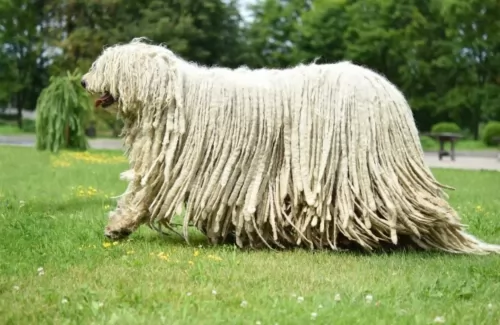 The Komondor is known for his strong guardian characteristics, especially with his human family. He is loving and loyal towards them while being wary of strangers.
The Komondor is known for his strong guardian characteristics, especially with his human family. He is loving and loyal towards them while being wary of strangers.
True, his coat can make people think twice before making this dog a pet, but if you're game and ready to attend to his coat, he can make an excellent family pet. They're fine with other pets too, and he is also an intelligent dog, capable of being easily trained.
He needs a good deal of exercise and can become noisy and destructive without the right amount of stimulation. If you do your part with the Komondor and provide him with a loving, caring home, he will be an awesome pet and guard you with his life.
 Being a large breed of canine, the Himalayan Mastiff has some of the typical health issues of large dogs. However, they also face a serious genetic disorder as well.
Being a large breed of canine, the Himalayan Mastiff has some of the typical health issues of large dogs. However, they also face a serious genetic disorder as well.
Canine Inherited Demyelinative Neuropathy (CIDN) – a fatal disorder seen in puppies by seven weeks of age. Puppies die before they are 5 months old.
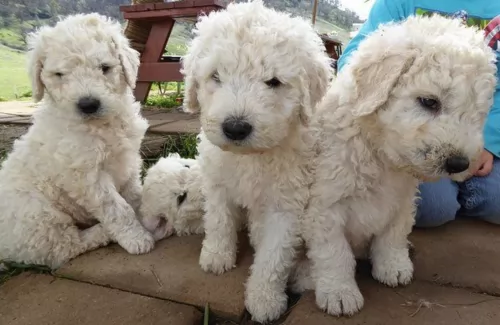 The Komondor is a healthy dog breed who can live to be 10, 11 or 12 years if you look after him well. There aren't any known genetic disorders prominent with the dog, but it pays to know about some of those that could strike -
The Komondor is a healthy dog breed who can live to be 10, 11 or 12 years if you look after him well. There aren't any known genetic disorders prominent with the dog, but it pays to know about some of those that could strike -
This is an irritating eye problem where the eyelash rubs up against the eyes.The result can be scratching of the cornea and eye infections. It is an eye problem which can be corrected with surgery.
Hip dysplasia is a serious genetically inherited disorder and common in large dog breeds. It is caused by a malformation of the hip joint. It can cause problems for the dog, weakening the hip and making it incapable of supporting the weight of the dog.
It also leads to pain for the dog, difficulty with moving and even total lameness. Weight, size of dog, age and genetics are all factors which can increase the dog's likelihood of developing hip dysplasia.
Whimpering, lethargy and refusing to put weight on the leg are common signs of hip dysplasia and your vet will go ahead with ways to relieve the pain and symptoms of your Komondor.
 This breed will eat less than you think they should but don’t overfeed. Puppies need a solid dry food for large dogs. You can free feed 1 cup three times per day.
This breed will eat less than you think they should but don’t overfeed. Puppies need a solid dry food for large dogs. You can free feed 1 cup three times per day.
For dogs over a year old you can free feed anywhere from two to four cups of dry food per day. Unlike many other breeds, the Himalaya Mastiff will only eat when hungry and they may not eat more than once a day. They will not overeat. The males might not eat at all when females are in season if they are around them.
They have good strength and athletic ability.
The Himalayan Mastiff needs regular, routine walks. It is important during these walks that the human leads the way, or the dog heals. Do not overwork a young Himalayan Mastiff. They need work related jobs like structured play time, walking the boundary of their territory, playing frisbee or catch. They work and play in short bursts then rest.
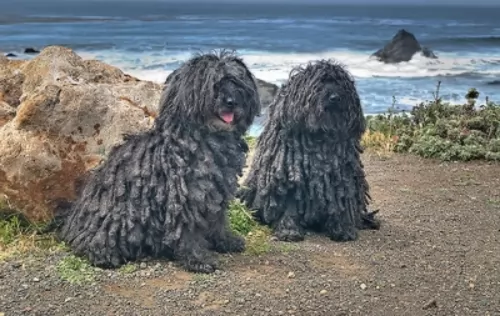 The Komondor is most certainly not a low maintenance dog with that extraordinary coat.Before the dog turns 1, the coat begins to form its cords. These cords can become discolored and matted, In fact the cords will need to be separated to keep the dog clean and free of matted hair.
The Komondor is most certainly not a low maintenance dog with that extraordinary coat.Before the dog turns 1, the coat begins to form its cords. These cords can become discolored and matted, In fact the cords will need to be separated to keep the dog clean and free of matted hair.
For those who keep the dog as a pet and who don't want him to be a show dog, he can be trimmed, otherwise the coat and its maintenance could turn out to be a real issue.
Of course once the distinctive coat has been sheared, he loses that typical and recognizable Komondor look.
Check his ears on a regular basis for wax- and dirt buildup so as to prevent ear infection.
Teeth need to be checked regularly to prevent tartar buildup and if you don't have the time or the knowledge to keep his teeth clean and maintained, take him to the vet as the teeth-treatments they do there will promote healthy teeth and gums.